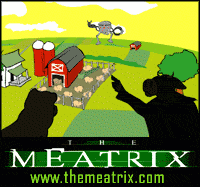|
Three Sisters Farm
Bioshelter Farmers
Sandy Lake, Pennsylvania
Their 2,500 square foot bioshelter -- a structure containing a
mini-ecosystem that supports the growth of a plethora of ingredients
that go into their popular salad blends -- makes more money than a
comparable field of hay or corn ever could. Located on the five
acre Three Sisters Farm in
Sandy
Lake, Pennsylvania, the bioshelter also costs little to operate,
relying primarily on solar energy for heat. It's the foundation
on which its owners, Darrell and Linda Frey, have built an enviable
position in the niche crop marketplace, selling certified organic salad
mixes, edible flowers, vegetables and herbs primarily to high-end
restaurants and CSA subscribers from Pittsburgh, just 60 miles to the
south.
"Our five acres of good silt loam with rolling topography gave us a
pond site as well as leveled and contoured gardens and a number of
microclimate possibilities," says Darrell. These are important
considerations when designing your farm using permaculture design
principles. According to Three Sisters Farm, which increasingly
consults with clients and offers courses on permaculture, permaculture
is a system of land use planning which incorporates concepts of
ecosystem dynamics, ecologically appropriate technologies, and an ethic
of care of the earth into a comprehensive design system.
Since starting their operations in 1989, one year after they put up
their innovative bioshelter, they've turned a cornfield into a
cornucopia of natural -- and diverse -- abundance which includes
extensive market gardens, perennial gardens, 1,000 square foot spiral
herb and flower garden, 1,000 square foot medicinal garden, and their
innovative bioshelter, all integrated into the landscape through
permaculture design.
"We grow a variety of crops, supplying eight to ten restaurant or
catering company accounts, two grocers and fourteen CSA subscribers,"
comments Darrell, noting both the diversification of what they grow and
to whom they end up selling their vegetables, herbs and flowers that
provides the $40,000 per year gross income. "Direct sales to
Pittsburgh restaurants and catering companies are the main focus of our
business along with serving CSA shareholders and half a dozen customers
arriving to the farm each week to pick up our vegetables. Our
customers look to us as food artists, viewing our diversity of
ingredients as the creative palate from which we concoct our salad
mixes." In addition to their three grown children, an intern
often assists on the farm during the busy summer season.
"Having diverse crops that include herbs, vegetables, flowers and
salad, has allowed for crop failures and irregular weather problems to
be less a factor on overall solvency of the enterprise," says Darrell,
who considers his operation a small scale agricultural enterprise
incubator. "We have school groups, teachers, and individuals
regularly visiting the farm. Some, like Christine McHenry-Glenn,
strike up a limited partnership with us. Christine now sells
native plants on a seasonal basis. The plants are propagated in
our bioshelter."
Managed as an ecosystem, it's the bioshelter that stands out as one of
Three Sisters Farm's innovations. Explains Darrell, "Our
bioshelter allows us to start seeds in the early spring, provides
heated space for us to maintain other plants needed for herb cuttings
as well as for making compost, serves as our office space, potting
shed, chicken house, and storage barn, and encompasses just about
anything else we might need on a small scale farm." Built in 1988 with
$60,000 in funding support from the Pennsylvania Energy Office and the
Frey's own investment of $30,000, the bioshelter allows Three Sisters
Farm to grow and sell their products year-round. It also helps
the operation reduce its carbon dioxide emissions -- the leading
contributor to global warming -- curb pollution, and reduce demand for
electricity. They also employ other market-extending growing
strategies outside, including the use of polytunnels and cold frames.
"We are trying to promote small scale, intensive market gardening and
apply permaculture design in order to be ecological and energy
efficient," says Darrell. "Due to its design, our bioshelter only
uses about $300 worth of wood for supplemental heat each year, a
fraction of what traditional greenhouses might cost to be
heated." The design of the greenhouse uses both an active and
passive solar heating system. Each bed in the greenhouse is made
from cinder blocks and contains a gravel bottom which is heated by a
fan-assisted labyrinth of ductwork; heat radiates upward into the soil
and plants. A 600-gallon indoor concrete pool filled with water
helps regulate temperatures.
Working through the Pennsylvania Association of Sustainable Agriculture
(PASA), Three Sisters Farm also pulled in a $4,300 grant from the
Pennsylvania Department of Environmental Protection's Office of Energy
and Technological Development to add a 125 Watt photovoltaic system to
convert sunlight to electricity in order to power a 12 Volt pump for
their irrigation system.
Three Sisters Farm is getting back to farming with, rather than
against, nature. "A lot of our emphasis is on ecology.
We're always learning more about nature. Most surprising is how
quick various species filled ecological niches, like when toads nestled
themselves in crevices near a water tank in the bioshelter or more
numerous birds, insects and wasps started congregating on the
grounds." Darrell reaffirms, in a humble awe: "This was just a
cornfield when we started."
When asked where Three Sisters Farm is headed, Darrell replies,
"teaching and tours are a growing part of our business." So
besides being farmers and bioshelter designers, they're becoming
educators -- helping others better understand the ecology that sustains
agriculture.
Life is short.

TELL US ABOUT YOUR GARDEN
& WHAT WORKS FOR YOU!
Contributions should be no more than 500 words in length. The writer of the
best contribution each month will have a link on our home page and newsletter
along with photos (if sent!) on our success page!
Email your contributions with the title
"My Simple Success" and put the text in the body of the email, not as an attachment.
Let us know if you have some images we can use (not essential) and remember to
tell us where in the world you garden!
If at first you don't succeed, call it version 1.0 !!
|


